|
|
 |
|
Cyclopoida ( Order ) |
|
|
|
Corycaeidae ( Family ) |
|
|
|
Corycaeus ( Genus ) |
|
|
|
Onychocorycaeus ( Sub-Genus ) |
|
|
| |
Corycaeus (Onychocorycaeus) catus F. Dahl, 1894 (F,M) | |
| | | | | | | Syn.: | Corycäus obtusus : Giesbrecht, 1892 (part., p.673, Pl.49, figs.29-30, Pl. 51, figs.12-14); Wilson, 1932 a (p.356, figs.F,M);
Corycaeus latus : Mori, 1937 (1964) (p.136, figs.F,M);
no C. catus : Mori, 1937 (1964) (p.135, figs.F,M);
Onychocorycaeus catus : Binet, 1985 (p.85, tab.3); Boxshall & Halsey, 2004 (p.494); McKinnon & al., 2008 (p.844: Tab.1); Lan Y.-C. & al., 2009 (p.1, Table 2, % vs hydrogaphic conditions); Vives & Shmeleva, 2010 (p.233, figs.F,M, Rem.); in CalCOFI regional list (MDO, Nov. 2013; M. Ohman, comm. pers.); Jagadeesan & al., 2013 (p.27, Table 3, 4, 5, 6, fig.11, seasonal abundance); Rakhesh & al., 2013 (p.7, Table 1, abundance vs stations); Anjusha & al., 2013 (p.40, Table 3, abundance & feeding behavior); Zakaria & al., 2016 (p.1, Table 1, Rem.); Jerez-Guerrero & al., 2017 (p.1046, Table 1: temporal occurrence)
Onchocorycaeus catus : Marques-Rojas & Zoppi de Roa, 2017 (p.495, Table 1). | | | | Ref.: | | | F. Dahl, 1894 (p.72); Farran, 1911 a (p.290, figs.F, Rem.); M. Dahl, 1912 (p.99, figs.F,M); Früchtl, 1924 b (p.23, 95, fig.); Dakin & Colefax, 1933 (p.209); Farran, 1936 a (p.138); Dakin & Colefax, 1940 (p.113, figs.F,M); Sewell, 1947 (p.284, Rem.M); Tanaka, 1957 (p.94, figs.F,M, Rem.); Fagetti, 1962 (p.51); Motoda, 1963 (p.242, figs.F); Owre & Foyo, 1967 (p.123, figs.F,M); Vilela, 1968 (p.40, figs.M); Shih & al., 1971 (p.155); Chen & al., 1974 (p.63, figs.F,M); Marques, 1976 (p.1002); Chahsavar-Archad & Razouls, 1982 (p.38); Gardner & Szabo, 1982 (p.100, figs.F,M); Kang & al., 1990 (p.54, figs.F); Kim & al., 1993 (p.270); Chihara & Murano, 1997 (p.966, Pl.216,217: F,M); Conway & al., 2003 (p.256, figs.F,M, Rem.); Marquez-Rojas & al., 2014 (p.10, Descr.F,M, figs.F,M, Rem., %); | 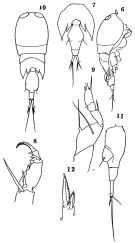 issued from : O. Tanaka in J. Fac. Agricult. Kyushu Univ., 1957, 11 (1). [Pl.9, Figs.6-12]. Female (from Japanese waters): 6, habitus (lateral right side); 7, urosome (dorsal); 8, A2; 9, P4. Nota: The abdominal segments and furca in the proportional lengths 58:20:22. Anal segment shorter than it is wide at the proximal. Furcal rami about 4 times as long as wide (14:4). Male: 10, habitus (dorsal); 11, urosome (lateral left side); 12, terminal spine of exopod of P2. Nota: Head and 1st thoracic segment separate. The abdominal segments and furca in the proportional lengths 59:19:22.Genital segment with a ventral median hook
|
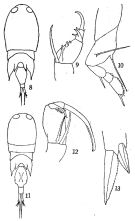 issued from : Q.-c Chen & S.-z. Zhang & C.-s. Zhu in Studia Marina Sinica, 1974, 9. [Pl.21, Figs.8-13]. Female (from China Seas): 8, habitus (dorsal); 9, A2; 10, P4. Male: 11, habitus (dorsal); 12, A2; 13, terminal spines of exopodite 3 of P2.
|
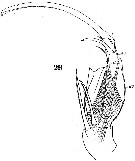 Issued from : W. Giesbrecht in Systematik und Faunistik der Pelagischen Copepoden des Golfes von Neapel und der angrenzenden Meeres-Abschnitte. – Fauna Flora Golf. Neapel, 1892. Atlas von 54 Tafeln. [Taf.49, Fig.29]. As Corycäus obtusus. Male: A2. B = basipod.
|
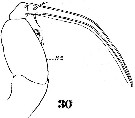 Issued from : W. Giesbrecht in Systematik und Faunistik der Pelagischen Copepoden des Golfes von Neapel und der angrenzenden Meeres-Abschnitte. – Fauna Flora Golf. Neapel, 1892. Atlas von 54 Tafeln. [Taf.49, Fig.30]. As Corycâus obtusus. Male: 30, Mxp.
|
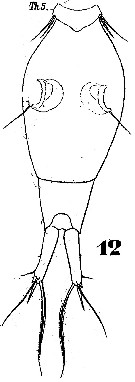 Issued from : W. Giesbrecht in Systematik und Faunistik der Pelagischen Copepoden des Golfes von Neapel und der angrenzenden Meeres-Abschnitte. – Fauna Flora Golf. Neapel, 1892. Atlas von 54 Tafeln. [Taf.51, Fig.2]. As Corycäus obtusus. Female: 12, urosome (dorsal).
|
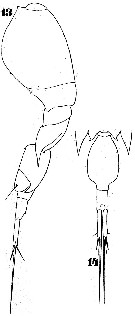 Issued from : W. Giesbrecht in Systematik und Faunistik der Pelagischen Copepoden des Golfes von Neapel und der angrenzenden Meeres-Abschnitte. – Fauna Flora Golf. Neapel, 1892. Atlas von 54 Tafeln. [Taf.51, Figs.13, 14]. As Corycäus obtusus. Male: 13, habitus (lateral left side); 14, urosome (dorsal).
|
 Issued from : W. Giesbrecht in Systematik und Faunistik der Pelagischen Copepoden des Golfes von Neapel und der angrenzenden Meeres-Abschnitte. – Fauna Flora Golf. Neapel, 1892. Atlas von 54 Tafeln. [Taf.51, Figs.13, 14]. As Corycäus obtusus. Male: 13, habitus (lateral left side); 14, urosome (dorsal).
|
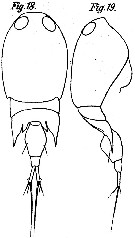 issued from : M. Dahl in Ergebnisse der Plankton-Expedition der Humboldt-Stiftung. Bd II, G. f1. I. Die Corycaeinen 1912. [Taf.XIII, Figs.18, 19]. Female: 18, habitus (dorsal); 19, (lateral right side).
|
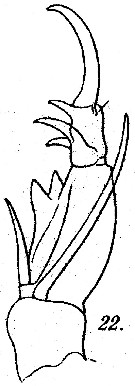 issued from : M. Dahl in Ergebnisse der Plankton-Expedition der Humboldt-Stiftung. Bd II, G. f1. I. Die Corycaeinen 1912. [Taf.XIII, Fig.22]. Female: 22, A2.
|
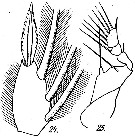 issued from : M. Dahl in Ergebnisse der Plankton-Expedition der Humboldt-Stiftung. Bd II, G. f1. I. Die Corycaeinen 1912. [Taf.XIII, Figs.24, 25]. Female: 24, endopod of P2; 25, P4.
|
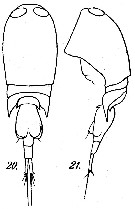 issued from : M. Dahl in Ergebnisse der Plankton-Expedition der Humboldt-Stiftung. Bd II, G. f1. I. Die Corycaeinen 1912. [Taf.XIII, Figs.20, 21]. Male: 20, 21]. Male: 20, habitus (dorsal); 21, idem (lateral left side).
|
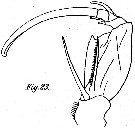 issued from : M. Dahl in Ergebnisse der Plankton-Expedition der Humboldt-Stiftung. Bd II, G. f1. I. Die Corycaeinen 1912. [Taf.XIII, Fig.23]. Male: 23, A2.
|
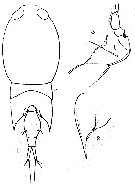 issued from : G.P. Farran in Proc. zool. Soc. Lond., 1911. [Plate XII, Figs.1-3]. Female (from Christmas Island): 1, habitus (dorsal); 2, 3rd and 4th thoracic segments (mounted); 3, P4. Nota: Cephalothorax 4-segmented. Lateral poins of 4th thoracic segment, keen and long. Caudal rami 4 times longer than width and as long as the anal segment. Outer edge spine of the 1st segment of exopod of P4 beyond to the 2nd segment; the outer edge spine of the 3rd segment of exopod of P4 approximately as long as the 3rd segment.
|
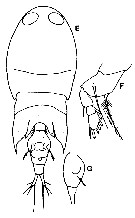 issued from : Y.S. Kang, S.-H. Huh & S.S. Lee in J. Ocanol. Soc. Korea, 1990, 25 (2). [Pl. 4, Figs.E-G]. Female (from Korean waters): E, habitus (dorsal); F, P4; G, genital segment (lateral, right side). Cephalothorax 5-segmented. Lateral points of 3rd thoracic segment extended to 1/2 the genital segment. Genital segment with with one process on the ventral side.
|
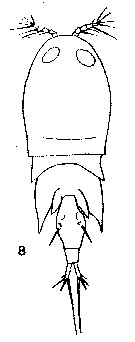 issued from : T. Mori in The Pelagic copepoda from the neighbouring waters of Japan, 1937 (1964). [Pl.74, Figs.8]. As Corycaeus latus. Female: 8, habitus (dorsal).
|
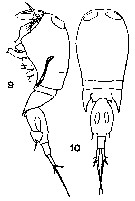 issued from : T. Mori in The Pelagic copepoda from the neighbouring waters of Japan, 1937 (1964). [Pl.74, Figs.9-10]. As Corycaeus latus. Male: 9-10, habitus (lateral and dorsal, respectively).
|
 Female: Thoracic segment 3 about the same width as the thoracic segment 2. Caudal rami much longer than the anal segment. Male: Genital segment much longer than the anal segment + anal segment.
|
 Issued from : B. Marquez-Rojas, O. Diaz-Diaz, L. Troccoli, J. Morales & L.M. Marcano in Métod. Ecol. Sistemat., 2014, 9 (3). [p.20, Fig.2, g-l]. Female (from Caraco Gulf, Venezuela): g, urosome (dorsal); h, A2; i, P4. Male: j, habitus (dorsal); k, A2; l, abdomen (lateral view).
| | | | | Compl. Ref.: | | | Wilson, 1942 a (p.180); Sewell, 1948 (p.393, 461); C.B. Wilson, 1950 (p.192); Chiba & al., 1957 (p.312); 1957 a (p.12); Yamazi, 1958 (p.155, Rem.); De Decker & Mombeck, 1964 (p.12); Mazza, 1966 (p.74); Furuhashi, 1966 a (p.295, vertical distribution in Kuroshio region, Table 9, 10); Palet, 1975 (p.660); Kovalev & Shmeleva, 1982 (p.86); Guangshan & Honglin, 1984 (p.118, tab.); Greze & al., 1985 (p.8); Sarkar & al., 1986 (p.178); Williams D. & al., 1988 (p.580); Hirakawa & al., 1990 (tab.3); Othman & al., 1990 (p.561, 564, Table 1); Godhantaraman, 1994 (tab. 6); Palomares Garcia & Vera, 1995 (tab.1); Shih & Young, 1995 (p.76); Webber & al., 1996 (tab.1); Go & al., 1997 (tab.1); Park & Choi, 1997 (Appendix); Hure & Krsinic, 1998 (p.105); Hsieh & Chiu, 1998 (tab.2); Noda & al., 1998 (p.55, Table 3, occurrence); Suarez-Morales & Gasca, 1998 a (p.112); Dolganova & al., 1999 (p.13, tab.1); Lavaniegos & Gonzalez-Navarro, 1999 (p.239, Appx.1); Lopez-Salgado & al., 2000 (tab.1); Ueda & al., 2000 (tab.1); Hwang & al., 2003 (p.193, tab.2); Rezai & al., 2004 (p.490, tab.2); Chang & Fang, 2004 (p.456, tab.1); Lan & al., 2004 (p.332, tab.1, tab.2); Lo & al., 2004 (p.89, tab.1); Wang & Zuo, 2004 (p.1, Table 2, dominance, origin); Alvarez-Silva & al., 2005 (p.39); Lopez-Ibarra & Palomares-Garcia, 2006 (p.63, Tabl. 1, seasonal abundance vs El-Niño); Zuo & al., 2006 (p.164: tab.1); Rakhesh & al., 2006 (p.93, Table 2, spatial distribution); Hwang & al., 2006 (p.943, tabl. I); Hwang & al., 2007 (p.25); Jitlang & al., 2008 (p.65, Table 1); Rakhesh & al., 2008 (p.154, Table 5: abundance vs stations); Ayon & al., 2008 (p.238, Table 4: Peruvian samples); Fernandes, 2008 (p.465, Tabl.2); C.-Y. Lee & al., 2009 (p.151, Tab.2); Hernandez-Trujillo & al., 2010 (p.913, Table 2); W.-B. Chang & al., 2010 (p.735, Table 2, 3, 4, fig.5, abundance); Hsiao S.H. & al., 2011 (p.475, Appendix I); Hsiao & al., 2011 (p.317, Table 2, indicator of seasonal change); Kâ & Hwang, 2011 (p.155, Table 3: occurrence %); Beltrao & al., 2011 (p.47, Table 1, density vs time); Maiphae & Sa-ardrit, 2011 (p.641, Table 2, 3, Rem.); Lavaniegos & al., 2012 (p. 11, Table 1, seasonal abundance, Appendix); Palomares-Garcia & al., 2013 (p.1009, Table I, abundance vs environmental factors); Tseng & al., 2013 (p.507, seasonal abundance); Varadharajan & Soundarapandian, 2013 (p.2: occurrence vs stations); Mendoza Portillo, 2013 (p.37: Fig.7, seasonal dominance, p.42: fig.10, biomass); Palomares-Garcia & al., 2018 (p.178, fig.3: relative frequency, Table 1) | | | | NZ: | 13 + 2 doubtful | | |
|
Distribution map of Corycaeus (Onychocorycaeus) catus by geographical zones
|
| | | | | | | | | | | | | Loc: | | | South Africa (E), off S Cape Verde Is., Barbada Is., Jamaica, Bahia de Mochima & Cariaco Gulf (Venezuela), G. of Mexico, Cuba, Florida, Bermuda, Portugal, Medit. (Alboran Sea, Adriatic Sea, W Egyptian coast), Red Sea, Arabian Sea, Seychelles, Indian, India (Saurashtra coast, G. of Mannar, Palk Bay, Pointcalimere- Manamelkudi,Kakinada Bay, Hooghly estuary, Godavari region), Bay of Bengal, off Christmas Is., Straits of Malacca, G. of Thailand, Aru Is., Philippines, Thailand, China Seas (Yellow Sea, East China Sea, South China Sea), Taiwan Strait, Taiwan (E, S, SW, Kaohsiung Harbor, NW, N, Mienhua Canyon, NE), Okinawa, S Korea, Japan Sea, Japan, Kuchinoerabu Is., Ariake Bay, Tanabe Bay, [Alaska, Bering Sea (in C.B. Wilson, 1950)], Vancouver Is.(in Herdman, 1898), Pacif. (W equatorial), Australia (Great Barrier, New South Wales, North West Cape, G. of Carpentaria), New Caledonia, Fidji Is., off Hawaii, W Baja California (Bahia Magdalena), G. of California, La Paz, Zihuatanejo Bay, Bahia Cupica (Colombia), Galapagos, Peru, off Chile | | | | N: | 106 | | | | Lg.: | | | (11) M: 0,867-0,8; (34) F: 1,01-0,92; M: 0,87-0,78; (84) F: 0,95-0,87; M: 0,85; (91) F: ± 1; M: ± 0,81; (104) F: 1; M: 0,9; (107) F: 1-0,93; M: 0,9-0,8; (109) F: 1-0,93; M: 0,9-0,87; (327) F: 0,96-0,89; (333) F: 1,15-0,89; M: 0,99-0,95; (666) F: 0,95; M: 0,8; (667) F: 1,18-1,09; (991) F: 0,9-1,18; M: 0,8-0,9; {F: 0,87-1,18; M: 0,78-0,99} | | | | Rem.: | Epipelagic. 0-526 m ((mainly 0-97 m) at Station N-1 (SW Bösö, E middle Japan) from Furuhashi (1966 a).
Sewell (1947, p.284, Male) notes: The proportional lengths of the various segments of the body (cephalon to caudal rami) as 343 : 99 : 55 : 96 : 24 :219 : 72 : 90 = 1000. The cephalon and 1 st pediger segment fused (but in stained specimens a darkly stained line, marking the line of fusion, can be seen), 3rd and 4th fused. Genital segment consists of a large oval region and a very short posterior cylindrical portion, there is a small hook anteriorly on the ventral aspect, the genital aperture is armed with a delicate seta, on the inner side of which is a small triangular tooth. A1 6-segmented, having the proportional lengths of 20, 16, 16, 25, 12, 11. In A2 the two basal spines the shorter, arising from the base of the 3rd segment, reaches to the spine on the anterior margin of the 3rd segment; the longer , arising from the 2nd segment, reaches well beyond the tip of the shorter; the shorter claw, arising from the proximal joint of the end region, is long and slender; the long distal claw reaches well beyond the base of the 2nd basal segment.
According to Kang (1990, p.54): Tanaka (1957) and Chen & al. (1974) reported that the length of the caudal rami of female was 4 times and 3.5 times its width respectively.
For Boxshall & Halsey (2004, p.491) the subgenus (Dahl, 1912) is considered as full generic status pending phylogenetic revision of the whole family at the generic level.
See in DVP Conway & al., 2003 (version 1) | | | Last update : 04/12/2020 | |
|
|
 Any use of this site for a publication will be mentioned with the following reference : Any use of this site for a publication will be mentioned with the following reference :
Razouls C., Desreumaux N., Kouwenberg J. and de Bovée F., 2005-2026. - Biodiversity of Marine Planktonic Copepods (morphology, geographical distribution and biological data). Sorbonne University, CNRS. Available at http://copepodes.obs-banyuls.fr/en [Accessed January 31, 2026] © copyright 2005-2026 Sorbonne University, CNRS
|
|
 |
 |



















